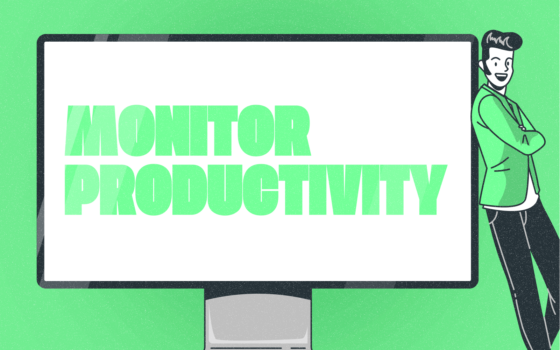Overworking Symptoms: How to Tell If You’re Working Too Much and What to Do If You Are

No question that working hard is important, but when you start showing overworking symptoms, it is time to ask yourself: Am I working too much? Signs of overworking can be subtle and easy to ignore, but if left unchecked, they can lead to serious health problems. In this blog post, we’ll discuss the common signs of burnout and overwork, how to tell if you’re an overworked employee, and what steps you can take to prevent it from taking a toll on your health.
The Myth of Working Hard
The first thing to understand is that working hard may mean something other than you’re productive. Research has shown that there’s a point of diminishing returns regarding long work hours. The study “The Productivity of Working Hours” by Stanford professor John Pencavel found that when a person works more than 50 hours a week, their productivity per hour drops dramatically.
After 55 hours, productivity plummets to the point where working extra hours is futile. Those who work up to 70 hours per week get the same amount of work done as those who work 55 hours. Thus, working more than 40 hours a week only leads to significantly more completed work.

Instead, it can actually lead to less productivity and ultimately to severe mental and physical health issues. According to the World Health Organization (WHO) and the International Labour Organization (ILO), long working hours caused 745,000 deaths from heart attack and ischemic heart disease in 2016, a 29% increase since 2000.
What Is It Like To Be Overworked?
Even if you don’t know exactly all the signs of being overworked, you know something doesn’t feel good. You might be starting to experience mental fatigue, you can find yourself less productive than you thought, and you will likely make many mistakes.
One of the signs your workload is too much is if you need more energy for work. Fatigue hinders dopamine* production, which is responsible for pleasure and motivation. This can lead to an exhausting cycle of burnout that feels impossible to break, leading you to suffer physical and mental health issues.
*Dopamine has many functions in the brain, such as voluntary movement, motivation, sleep, mood, attention, working memory, and learning. Dopamine is commonly associated with the brain’s reward system, providing enjoyment and reinforcement to motivate a person to perform certain activities proactively.
Japan’s Overworking Problem
And you are certainly not the only one. Japan has a serious overworking problem! Back in 2015, Prime Minister Shinzo Abe even declared overwork a national health crisis after a series of high-profile deaths from karoshi, or in English, death by overwork. According to the Japanese government, karoshi kills at least one person every day.
In 2016, three-quarters of Japanese workers said they worked over 80 hours of overtime per month. In 2017, a Japanese media worker “died from overwork” after logging 159 hours in a month. She had a heart attack. While Japan’s work environment is notoriously intense, long work hours are certainly not limited to Japan since other countries are also in the running for the most overworked ones! It’s certainly not a spot to be proud of.

Difference between Overworked Employees and Employee Burnout
This is a difference worth considering. Overwork and burnout have similarities but are not alike! Overworking means working too hard or too much. Burnout is an even bigger problem. Employee burnout is a state of physical, emotional, or mental exhaustion caused by prolonged or excessive stress. It occurs when someone experiences long-term and unresolved job-related stress.
Employee burnout is a long-maintained state of overworking. On the other hand, overworking is a condition that arises when an employee works more than 50 hours per week. It can also be due to having too many responsibilities at work, feeling like you need more control or support, or simply being bored with your job.
Get more out of your business
Get the best employee engagement content every week via mailing list
Symptoms of Overworking
You might think: Okay, but how do I know if I work too much? At first, overwork exhaustion symptoms can be challenging to spot and can be confused with other health conditions. However, physical symptoms and mental and behavioral signs can indicate you have too much work going on.
High Blood Pressure and Cardiovascular Problems
Working long hours increases the risk of high blood pressure and other cardiovascular problems. The stress of continuously working overtime without enough rest makes it harder for your body to regulate blood pressure, leading to chronic conditions like hypertension.
Anxiety and Depression
According to the National Institute of Mental Health, people who work more than 40 hours per week are more likely to have anxiety and depression. Anxiety appears as a result of not being able to relax after hours. This may be due to high cortisol levels, the hormone part of your body’s stress response. Depression makes you feel flat and hopeless and can interfere with a healthy work life balance.
A Weakened Immune System
Overworking can weaken your immune system and make you more prone to illness. The stress of long hours at work causes your body to produce cortisol, which suppresses the immune system. This makes it easier for you to catch a cold or other common illness.
Insomnia and Sleep Disorders
Working long hours can also disrupt your sleep patterns. The stress of overwork and burnout can make it difficult for you to fall asleep and stay asleep, leading to chronic insomnia. This can cause fatigue, irritability, and difficulty concentrating during the day.
Weight Gain and Other Digestive Issues
Overworking can also contribute to weight gain and other digestive issues. This is because stress can affect your body’s ability to regulate insulin, which controls the amount of sugar in your blood. When this system is disrupted, it can lead to weight gain and an increased risk of type 2 diabetes.
Stress Hormones
Don’t be surprised if we tell you that you get addicted to stress! Stress hormones, when released trigger the “fight or flight” response. This is why some people feel they need to be in a constant state of stress. Our bodies are not designed to withstand such high levels of continuous stress.
High cortisol levels have been linked to weight gain, sleep problems, and mood disorders. If you’re experiencing any of these symptoms, taking a step back and assessing your work situation is essential. How many hours are working? Do you have enough time to recover between shifts?
Difference Between Overworked Employees and Employee Burnout
This difference is worth considering. Overwork and burnout have similarities but are not the same thing! Overworking means working too hard or too much. Burnout is an even bigger problem.
Employee burnout is a state of physical, emotional, or mental exhaustion caused by prolonged or excessive stress. It occurs when someone experiences long-term and unresolved job-related stress.
Common Reasons for Being Overworked
There are several reasons you may be overworked. Your job may be demanding, or you may feel like you need to prove yourself. You may also have trouble saying no to work requests, or you might work in an environment where long hours are the norm. Here are some common reasons for being overworked:
- Having a high-pressure job: Some jobs, such as those in the medical field or corporate world, come with high-stress levels and long hours.
- Feeling like you need to prove yourself: If you’re new to your job or want to advance in your career, you may need extra hours to prove yourself.
- Trying to do it all: Some people have difficulty saying no to extra work or may feel they need to handle everything themselves.
- Long hours work culture: If your workplace has a company culture of working long hours, it can be difficult to set healthy boundaries.
- Perfectionism: You’ll likely put in excessive hours if you’re constantly striving to be perfect.
If any of these sound familiar, you may be at risk of overwork. It’s important to recover before it breaks your personal life balance or causes serious health problems. Below are a few things you can do to get started to achieve your dream work life scenario:
What to Do If You’re Overworked
Talk to your Boss
Yes, we know how intimidating that might sound. But chances are, your boss has no idea you’re overworked! In most cases, they want to see their employees happy and healthy. Take the time to schedule a meeting with your boss and explain how you feel. Suggest solutions such as delegating tasks or adjusting your workload to manage a healthy balance.
Prioritize Self-Care
Taking the time to prioritize self-care and recharge outside of work is crucial and essential for maintaining overall well-being. Make it a point to add a lunch break throughout your day to enjoy activities that bring you joy and relaxation. Engage in physical activities like exercising or dedicate quality time to your loved ones.
Set Boundaries
One of the best ways to avoid burnout is to set clear boundaries between work and personal life. This might mean setting a strict cutoff time for work daily or only checking email during certain hours. Learn to say no to absurd work schedules!

Take Breaks
It is important to prioritize taking regular breaks throughout your workday, even if it’s just a short walk around the office or stepping outside for fresh air. These breaks provide a physical break from sitting and staring at screens and offer a mental pause that allows for rejuvenation and increased focus.
Know Your Limits
It’s important to know your limits and prioritize tasks based on importance and urgency. Be realistic about what you can accomplish in a day and don’t overextend yourself. Remember to take breaks and delegate tasks when necessary, especially when you overwork yourself.
Stay Organized with a To Do List
Keep your to-do list brief and focus on three to five essential and demanding daily chores. The most significant tasks will make you feel incredibly productive once accomplished. Simple tasks like getting groceries, paying bills, or doing laundry can wait until the weekend.
Get Enough Sleep
Lack of sufficient sleep can harm productivity, work performance, and stress levels. Prioritizing and allocating enough time for quality sleep each night is crucial, allowing your body and mind to fully recharge and rejuvenate, ensuring you are well-prepared to tackle the following day’s challenges.
Eat Healthy Foods
To help counterbalance the stress your body is dealing with, it’s vital to nourish yourself with healthy foods. Eating well-balanced meals and staying hydrated can boost your energy levels and provide essential nutrients needed to combat the effects of overwork.
Seek Support
If you continue to feel overwhelmed after following the above advice, seek support from your loved ones or a mental health professional. It’s important to have a strong support system to help you manage the stress of overwork and prevent burnout.

How Do You Tell your Boss You’re Overworked?
We understand that the first advice we gave you to avoid overwork yourself is challenging! Telling your boss that you’re overworked can be a difficult conversation. After all, no one wants to admit they can’t handle their workload. There are a few different ways to approach the conversation with your boss. You can:
- Schedule a one-on-one meeting to discuss your workload and how it’s impacting your health and well-being.
- Mention specific examples when you were overwhelmed with too much work or needed more support.
- Offer potential solutions, such as delegating tasks or adjusting deadlines.
Stop Working Hard, Start Working Smart
Working smart means being efficient, productive, and focused. It’s about working smarter, not harder. When you work smart, you save energy, boost productivity, and increase your self-esteem. If you’re frequently feeling overwhelmed, stressed, or burnt out at work, it’s important to take action before it leads you to serious health problems. Work to be smart, not sick!
-The Monitask Team
Frequently Asked Questions
What Happens When You Work Too Much?
Side effects of working too much can include chronic stress, sleep deprivation, deteriorating physical health, strained relationships, and lowered mental well-being. This overwork can potentially escalate into burnout, causing significant personal and professional disruption.
What is Called Overworking?
Overworking, also known as workaholism, refers to the condition where an individual excessively works beyond the standard working hours, often to the detriment of their physical and mental health and personal relationships.
What to Do If I Feel Overworked?
If you’re feeling overworked, it’s crucial to follow the strategies outlined in this blog—talk to your boss, prioritize self-care, set boundaries, take breaks, know your limits, stay organized, get enough sleep, eat healthy, and seek support if needed.


